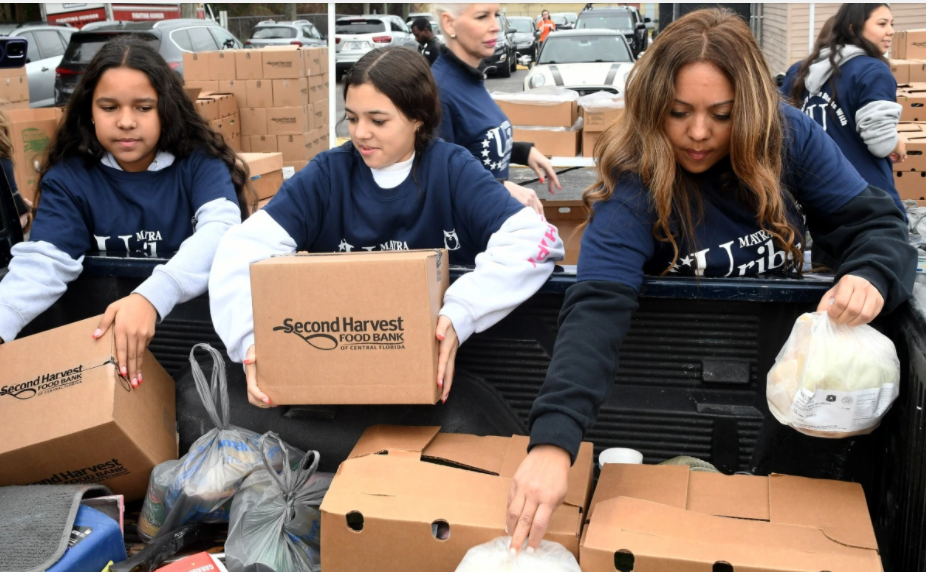This year, funding for several pandemic-era aid programs came to an end, giving Americans less options to deal with growing costs.
Washington, DC Americans have been depending more and more on safety net services in spite of low unemployment and rising incomes; nevertheless, in the new year, these programs may face additional challenges due to rising demand and potentially threatened federal financing.
Funding for several Covid-era programs, such as extra food benefits, housing aid, and funding for child care facilities, ran out during the course of 2023. As a result, many Americans have less resources in the new year to deal with prices that are still roughly 20% higher than they were before the pandemic.
There are yet more difficulties ahead. Upon its return from the winter vacation, Congress will prioritize approving a budget for 2024 as one of their top priorities. The financial extensions from last year are scheduled to expire in two waves on January 19 and February 2, respectively, and the ongoing budget dispute may jeopardize several initiatives. While Senate Democrats are unlikely to have the votes to reinstate pandemic-era benefits like the child tax credit or rental assistance, House Republicans are pushing for cuts to social program expenditure.
The demand for government assistance is growing, which could lead to reductions. Nearly a million additional Americans have started getting government assistance through the Supplemental Nutrition Assistance Program, also known as food stamps, in the last year. The number of people receiving food stamps has climbed by 2.3 million to over 42 million since the outbreak began in early 2020.
Meanwhile, when a funding boost from the Covid era expired in March, the benefits for people who qualify for food stamps have decreased by an average of at least $95 per person per month.
In recent months, the food stamp program—which was budgeted $111 billion for this year—has also imposed stricter qualifying standards. In the past, in order to be eligible, the majority of childless persons without disabilities between the ages of 18 and 49 had to prove they worked at least 80 hours each month. However, as a result of laws raised by the debt ceiling this year, the labor requirement now applies to those who are 50 years of age or older, and it will increase to 54 in October.
Republicans in the House have been pushing for more program changes, arguing that recipients under 65 must fulfill work requirements and that recent work exemptions—which apply to the homeless and young adults leaving foster care—should be eliminated.
Food banks claim that the improvements made to the food stamp program this year, along with increased food prices that are still 25% higher than before the pandemic, have resulted in an increase in the number of people seeking assistance.
“Inflation is real, as we know. Fuel prices have gone up. “Many other food assistance programs that were in place during COVID have come to an end,” stated Carrie Stoltzfus, executive director of Food & Friends, a Washington, D.C.-based nonprofit organization that provides meals to individuals with illnesses. “Many of those other programs just don’t exist, and we’re the only choice for sick people.”
This year, the organization will distribute 1.9 million meals, a 16% increase from 2022 and nearly twice the yearly total given prior to the pandemic.
The Special Supplemental Nutrition Program for Women, Infants, and Children, or WIC, is another food program that is facing pressure. According to Georgia Machell, the National WIC Association’s interim president, funding for the program has not increased in line with the program’s enrollment growth. According to her, state programs may have to impose waitlists for new enrollees or reduce payments for current recipients if funding levels are not increased beyond $6 billion in 2024.
“There could be serious challenges unless Congress acts to protect and strengthen WIC by providing appropriate funding,” Machell stated. This is quite unusual. In the past, Congress has supported WIC with support from both parties and has allocated the necessary funds. Thus, this is not how things usually work.
Even the $615 million budget increase that the White House has proposed for WIC in 2024 would fall short since the Biden administration miscalculated the program’s growth this year, according to the National WIC Association.
Another issue that low-income households must deal with is rising housing expenses, especially for those who depend on rental assistance programs. An increasing number of Americans are finding it difficult to afford housing, particularly now that pandemic-related renter aid programs like federal rental assistance and eviction moratoriums have ended.
According to a federal survey that was made public last month, there were over 650,000 homeless persons, an increase of 12% from the previous year. The Department of Housing and Urban Development’s study ascribed the increase to rising rents and the expiration of aid from the pandemic.
Government initiatives meant to assist low-income families in paying for rent have found it difficult to keep up with the escalating cost of housing. The increase in rent has especially had a negative impact on the Section 8 voucher program, which helps cover the gap between an individual’s rent payment and the going rate.
An estimate by the left-leaning Center on Budget and Policy Priorities in Washington suggests that under a House plan, the number of persons eligible for housing vouchers might drop by 112,000, while under a Senate plan, the number of recipients could drop by 80,000. The United States allocated $30 billion for the program in 2023.
According to Sonya Acosta, a senior policy analyst at the Center on Budget and Policy Priorities, “the program is already underfunded, there are long waiting lists for it, and only about 1 in 4 eligible households are actually able to see any form of federal rental assistance.” “If Congress doesn’t provide enough funding, it means that fewer households overall will receive assistance due to cost increases.”





